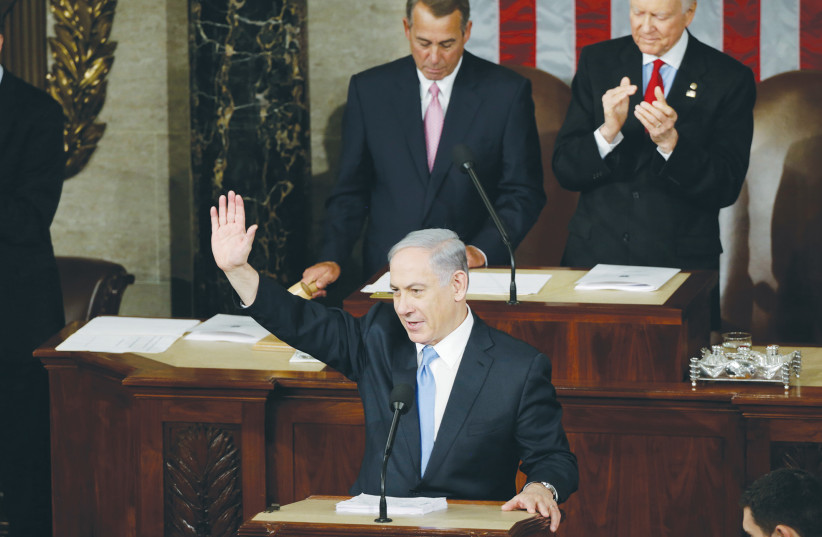by Douglas Altabef
I believe that an across the board right-wing coalition, religious and secular, can and must address these issues.
 |
THEN-PRIME MINISTER Benjamin Netanyahu addresses a joint meeting
of Congress in 2015. Bibi correctly calculated that maintaining
consensus support for Israel in America did not necessitate a
willingness to downplay opposition to Iran, says the writer.
(photo credit: GARY CAMERON/REUTERS)
|
Elections in Israel can be viewed as punishments or as opportunities. I would suggest that the lengthy string of inconclusive outcomes preceding the recently dissolved government were the former.
Conversely, the Bennett-Lapid government provided the context for regarding the election to come as an essential opportunity. The Bennett-Lapid government was instrumental in several regards. For one thing it highlighted the shortcomings of the government that preceded it. Not because Naftali Bennett solved pre-existing problems, but because those problems became inescapably evident.
Issues such as Supreme Court reform, illegal Bedouin construction, illegal Palestinian incursions into Area C – all issues that had festered and been “managed” became both more visible and more intractable.
Bringing the Arab party Ra’am into the government was highly instructive, but also fraught with tension. What took Ra’am from a breakthrough coalition experience to a source of concern was its position as the “10th man in the minyan.” In other words, it had undue influence based on its ability to cause the government to collapse.
This influence colored the innovation. While it was perfectly appropriate for Ra’am to seek greater resources for its constituents, there was the emerging sense that it was involved in an exquisite dance of trying to be part of the government and yet still holding to values that could be fairly thought to be anti-Zionist.

In addition, the party received concessions, such as electrical hookups for heretofore illegal settlements, which many saw as unfair given the inability of Jewish settlements to be similarly normalized. The elaborate dance of the coalition to keep itself together was both gravity-defying and exhausting. It was hard to envision a lasting coalition whose driving raison d’être was keeping Benjamin Netanyahu out of power, and where its own weakness and vulnerability was touted as its greatest strength.
So now we have the opportunity to consider going in a different direction, and the experience of the recently dissolved coalition should be instructive as to what needs to be changed. Ironically, while the coalition highlighted the errors of omission of the Bibi governments, it also highlighted his astute handling of international relations.
I do not believe Bibi would have handled the Ukrainian conflict in such a way as to endanger our delicate dance of accommodation with Russia. I also don’t believe he would have been as focused on obtaining the elusive if not impossible approval of US Democrats and progressives in the name of furthering bipartisan American support for Israel.
Bibi had correctly calculated that maintaining threshold consensus support for Israel in America did not necessitate a willingness to downplay opposition to Iran nor to soft pedal the importance of the Abraham Accords. I do not believe that Bennett and certainly not caretaker Prime Minister Yair Lapid understand the self-destructive progressive priorities of the Biden administration; priorities that inevitably hold Israel in disfavor as being the white privileged cisgendered oppressors of the indigenous Palestinian people. (Yes, there it is. You can’t make this stuff up.)
With that kind of an outlook, it is hard to see us as getting anything close to most-favored nation treatment. So, with this as background, what are the most important missions to accomplish in a new government? Answering that question should make the choices of a new coalition somewhat more self-evident.
A recent assessment by Robert Malley, the lead US negotiator on the JCPOA (the Iran deal), that Tehran is rapidly approaching the material ability to create a bomb and that all negotiations might thereby become moot, is truly frightening. The inescapable takeaway from this is that the task of stopping Iran from reaching nuclear breakout will inevitably fall to us.
Once again, we see that talk is cheap unto meaningless and we will be blamed for whatever we do on the world’s behalf. While none of our leaders has been superb in tackling Iran, I would certainly sleep better knowing that the ones who have been disrupting Iran for years were overseeing the effort.
Domestic issues and how to solve it
IN TERMS of domestic issues, the next government must stop kicking the can on all sorts of issues. The runaway price of housing; the oligarchical nature of the Supreme Court, including its self-reinforcing method of choosing justices; the assertion of sovereignty be applying one set of laws to all citizens in all matters, but especially as concerns the legality of building; restoring the teaching of Tanach as a priority in secular schools, these are among the most pressing issues that we face.
I believe that an across the board right-wing coalition, religious and secular, can and must address these issues. The Right’s assertion of the illegitimacy of the previous coalition will be judged by its seriousness in addressing these very issues. Otherwise, it’s just more of the same with different faces singing similar lyrics to the same old songs.
While every election is important, I believe this one is critical. The West is reeling, losing its way in a morass of woke-instilled globalism. Traditional values are being discarded in favor of identity-driven politics.
Israel must stand up as the exception to all of this. We must stay true to the Zionist vision of creating a safe haven for the Jewish people, respecting the rights of non-Jews and elevating the importance and uniqueness of being a Jewish state.
We must show our citizens we are serious about these matters. They are the issues that will enshrine legitimacy, and irreplaceability if they are addressed with the goal of solving problems, not just of looking busy.
Given the stakes, I would certainly hope the junior high school demeanor of “who I will sit with and who I wouldn’t be caught dead associating with” has to be set aside in the name of the greater good. I would love to see each of the right-wing parties pledge to work to address these and other pressing issues as primary obligations owed to the citizens of Israel.
We need to get serious about the business at hand. Let’s do it, and get it Right.
Douglas Altabef is the chairman of the board of Im Tirtzu, and a director of B’yadenu and the Israel Independence Fund.
Source: https://www.jpost.com/opinion/article-711609
No comments:
Post a Comment